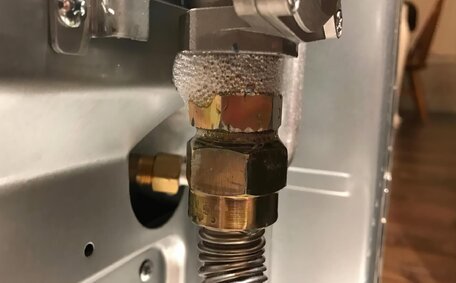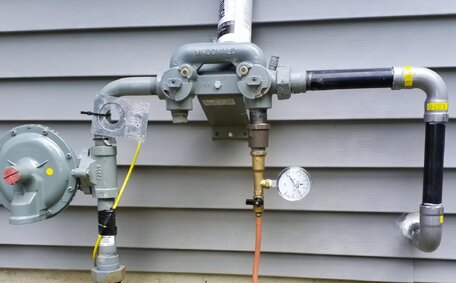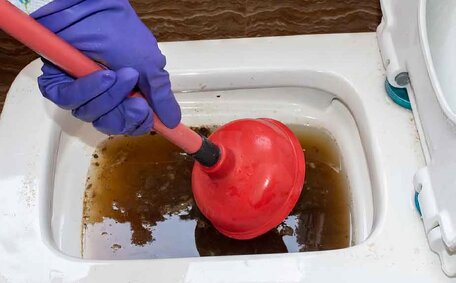What Causes Brown Water from Hot Water Taps?
Brown water from your taps often indicates an issue with your plumbing system. The common culprits are:
Rusty Pipes
Over time, the interior of older galvanised pipes may corrode and release brown residue, especially when the flow of hot water from your tap is irregular. The flow of brown water from the heater can disturb rust particles and sediment, resulting in discoloured water which poses potential health risks.
Corrosion in Your Water Heater
Your water heater’s interior may corrode over time, leading to a build-up of rust and sediment. Temperature shifts between cold and hot water can cause these deposits to dissolve, giving your tap water a brown hue.
Sediment Disruption in the Water Supply
Local construction or water main problems can stir up sediment, causing your home’s tap water to appear brown. This is often a temporary issue that clears up after some time.
High Iron or Manganese
High levels of iron and manganese are common culprits behind brown tap water. Water treatment systems, such as filters, can effectively remove these metals and protect your water supply.
Should the concern with water coming out your tap looking dirty arise suddenly, it’s most likely that running the taps for 15-30 minutes may cleanse the piping. Should the brown water issue remain unresolved and the problem persists beyond a day, it’s wise to call professional licenced plumbers for an inspection of your hot water system and pipes.
Sediment Buildup in Your Water Heater
Over time, sediment comprising brown rusty flakes and minerals like iron and calcium can accumulate in your heater, potentially resulting in discoloured water.
As the brown hot water is drawn from the tank, Sediment gets stirred up and can cause brown water discolouration emerging from your taps. The hotter the temperature, the more sediment that can stir up in the hot water.
Signs that sediment buildup is affecting your hot tap water include:
- Hot water has the same problem of being discolored or cloudy but runs clear after a while
- Rumbling or popping noises from the tank as sediment can stir up
- Reduced hot water flow rate
- Corrosion around brown water tap fittings
To verify sediment buildup, inspect the tank’s interior if accessible. Flushing your cold tap for 5-10 minutes can also help clear any sediment.
Avoid issues by annually flushing your water heater to break up sediment and installing a whole house filter to trap minerals before they enter the tank.
We recommend, if the sediment level is high, engaging a skilled plumber for a professional flush to fully clean out the tank. Catching and addressing buildup early can help prevent damage and extend the life of your water heater.
Rusty Pipes or Corrosion
Corrosion within pipes, which can cause water discoloration, is frequently what should be examined when faced with a brown or rust-tinted output from hot taps. As old iron pipes age, their internal surfaces begin to rust and corrode. Hot water accelerates this process by dissolving iron and rust particles that then make their way through pipes, potentially affecting your cold water as well.
Indicators of pipe corrosion are:
- Brown tap water or red, yellow discolored water when using hot taps
- Metallic taste in hot water
- Rumbling or rattling sounds from pipes as hot water flows
- Reduced hot water pressure
- Rust staining or drips near pipes and joints
Although not visually pleasing, a faint rust taint in hot water could be considered safe to drink and not deemed a health risk. However, persistently heavy discoloration, akin to brown water coming out from taps, might not be safe to drink and could potentially allow disease-causing bacteria to accumulate in pipes.
Replacing severely corroded pipes is the ultimate solution. In the interim, running hot taps for a few minutes may help clear some rust buildup from the water until it runs clear. If problems persist, a new supply water treatment system or professional pipe cleaning can help manage corrosion coming your way.
Regular flushing of your water heater can minimize rust in the pipes. Upgrading old pipes can also forestall corrosion-related problems.
For persisting brown water, a problem your pipes emit, please call a licenced tradesperson to assess the challenges your system confronts. They can properly diagnose the root cause and recommend fixes to restore clear hot water.
Disturbances in Your Water Supply
At times, external disturbances impacting municipal water conduits can be the precursor to transitory water discolouration. Construction activity in the vicinity, interruptions in water mains, routine upkeep, or fluctuating pressures can dislodge residue that ends up coming through your residential plumbing.
Check with your local water authority if there have been any disturbances, such as water main issues, that might contribute to your brown water situation. A disruption in service often leads to discolouration as the process can stir sediment within the pipes.
Try running both hot cold taps for 5-10 minutes to help flush out this sediment after the water supply has stabilised. Should you find the brown water issue continues for more than a couple of hours, it’s time to contact your local professional plumber.
Generally, with supply line disruptions, brown water taps output is a transient concern that should dissolve after plumbing is flushed. If problems persist, there may be a fundamental issue with the water coming your home’s hot water system or pipes.
Is Brown Water Harmful? Potential Health Risks
Though aesthetically unpleasing, brown or rust-coloured hot tap water is usually not harmful in small quantities. However, its occasional metallic taste can cause concern.
If the discolouration is significant, that could indicate a tap water problem, making it advisable to avoid using discoloured hot water for drinking or cooking. Over time, ingesting high amounts of rust particles could potentially lead to stomach discomfort or nausea in sensitive individuals.
That said, the health risks associated with temporary, mild discolouration of hot water are very low. The main concern is aesthetic rather than safety related.
However, severely rusted internal pipes can allow disease-causing bacteria to accumulate over time. Additionally, leaking rusty pipes can promote mould and mildew growth.
While short-term brown water is normally harmless, persistent or worsening discolouration, especially if it jeopardises safe drinking quality and if accompanied by a decrease in water pressure, warrants inspection by a professional plumber. They can assess if there is a larger underlying issue that needs to be addressed.
Testing to Identify the Source of Brown Water
To confirm whether the brown water coming out occurs at all hot taps, or only some. System-wide discolouration points to the water heater or cold supply as the culprit.
Compare hot and cold water from the sa>- Test the water from exterior taps like your garden tap. If the cold water outside is clear, the problem likely originates within the home’s hot water system.
Pinpointing the source will help diagnose any underlying issues. Where uncertainty remains, contact a professional plumber for an inspection and accurate assessment. They can perform checks and take samples if needed to determine whether remedial work is required on your hot water unit, pipes, or the main water supply.
To identify the cause of brown water, systematically test water from various taps to determine if the origin is your hot water system or cold water supply:
\ - Check if water comes out of your hot taps is brown, or only from some.
\ - Compare hot and your cold water from the same taps. Brown water from the hot water only then suggests a hot water system problem, while discolouration from both suggests an issue with the cold water inlet or pipes.
\ - Test the water from exterior taps like your garden tap.
\
Troubleshooting Solutions: Flushing and Replacg your water heater annually helps clear out sediment that can discolour hot water. Draining the tank using the T&P valve and then refilling it with fresh water can purge rust flakes and minerals.
Replace Faucet Aerators
Install new faucet aerators to replace old, clogged ones for a cost-effective solution that filters out sediment, enhancing water clarity.
Inspect and Replace Parts
Examine pipes, fittings, valves and your water heater for heavy corrosion, leaks or failure. Replacing worn gaskets, leaky components or outdated pipes can stop rust from entering the water.
When facing intricate fixes or complete overhauls, engage a skilled tradesperson adept at handling your water pipe dilemmas. Attempting DIY fixes on a severely damaged hot water system risks further issues.
Regular maintenance extends system life, but some parts may need replacement for longevity. Seek a professional inspection if issues remain after flushing.
Preventing Future Brown Water Issues
To help prevent brown water problems from recurring, it’s important to be proactive about maintaining your plumbing system. Here are some tips:
Flush Your Water Heater Annually
Schedule an annual flush of your kitchen’s hot water heater to remove sediment before it can be stirred up into the water supply. This quick maintenance task helps optimise performance and lifespan.
Install Water Filtration
Housewide filters, or specific ones at your taps, get rid of impurities, keeping the water safe from discolouration and sediment. Regular filter changes are needed for effectiveness.
Use Pipe Insulation
Insulating hot water pipes can reduce internal corrosion and rust buildup by maintaining consistent water temperatures.
Upgrade Old Plumbing
Replacing outdated steel or iron pipes prone to rusting with newer copper or plastic piping can prevent discolouration issues.
Water Treatment
Water softeners, sediment filters, and iron removal systems help improve water quality before it reaches your taps, reducing brown water your taps may encounter.
Regular Inspections
Have a licenced plumber routinely inspect your water heater, pipes and fittings for early signs of corrosion. Timely repairs prevent more significant brown water problems.
Proactive care means minor issues can be resolved before developing into major repairs. A plumbing professional can help create an effective maintenance plan.
When to Call a Professional Plumber
If you’ve tried troubleshooting solutions like flushing your water heater and the brown water persists, it’s a sign professional help is needed. Contact a licenced plumber right away if you experience:
- No improvement after running taps for several minutes
- Worsening water discolouration or pressure loss
- Visible pipe corrosion or leaks
- Continued problems after replacing fixtures or aerators
- Discoloured water from both hot and cold taps
Our expert team of licensed plumbers at Kenthurst Plumbing are ready to offer comprehensive plumbing services to diagnose and resolve brown water issues. For rapid service and clear water flow, contact us 24/7 by email or call 1300 349 338.
If brown water continues after troubleshooting efforts such as flushing your water heater, professional assistance may be necessary.






